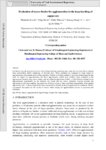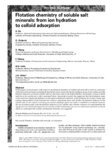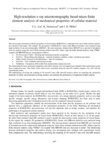|
|
Creator | Title | Description | Subject | Date |
| 51 |
 |
Miller, Jan D. | Evaluation of a PC image-based on-line coarse particle size analyzer | A PC image-based, on-line coarse particle size analysis system is being developed for the control of crushing and grinding circuits. Initial results had indicated that the system is accurate when tested with irregularly shaped particles which are stationary and do not overlap with each other. Now th... | Sampling; Measurements; Analysis | 1993 |
| 52 |
 |
Miller, Jan D. | Evaluation of plantwide control strategies for coal preparation plants | The quality of cleaned products from coal preparation plants is often variable due to natural fluctuations in the washability characteristics of the plant feed. To combat this problem, many modern plants have installed on-line analyzers that provide feedback for the real-time control of product q... | Circuit; Yield; Optimization | 2000 |
| 53 |
 |
Miller, Jan D. | Evaluation of stucco binder for agglomeration in the heap leaching of copper ore | It is known that the presence of excess fines in heap leaching operations may cause low recovery due to reduced heap permeability and/or channeling of lixiviant flow. These problems are mitigated to some extent by agglomeration pretreatment prior to heap leaching. Sulfuric acid leach solution is the... | | 2011-01-01 |
| 54 |
 |
Chandran, Ravi | Evolution of microstructure and phases in in-situ processed Ti-TiB composites containing high volume fractions of TiB whiskers | A series of titanium composites, with varying volume fractions of titanium monoboride (TiB) whiskers, were made by mixing various proportions of titanium (Ti) and titanium diboride (TiB2) powders followed by hot pressing. The phases present were identified by x-ray diffraction. | Morphology; diffraction; relative intensity | 1999 |
| 55 |
 |
Miller, Jan D. | Experimental evaluation of a mineral exposure model for crushed copper ores | Copper mineral inclusions dispersed in crushed ore particles have a certain size distribution (grain-size distribution). For efficient heap leaching processes, the crushing plant should be designed and operated to crush the ore to an appropriate particle-size distribution so that copper mineral grai... | Grains; Particles; Distribution | 2006 |
| 56 |
 |
Miller, Jan D.; Herbst, John A. | Factors affecting droplet size distributions produced in dispersed phase mixers | Droplet size distributions were determined by stabilizing in gelatin and measurement of the distributions by means of computerized image analysis. Several variables that affect droplet sizes were studied and the resulting size distributions were modeled via a population balance equation. Key paramet... | Gelatin; Phases; Agitating | 1981 |
| 57 |
 |
Miller, Jan D. | Fast flotation with an air-sparged hydrocyclone | The status of the research programme on air-sparged hydrocyclones at the University of Utah is presented. Fast flotation of coal, oil shale, and copper porphyry ore has been demonstrated with capacities far exceeding those of conventional flotation cells. In addition to the performance characteris... | Cells; Capacity; Froth | 1984 |
| 58 |
 |
Miller, Jan D. | Fine coal flotation in a centrifugal field with an air sparged hydrocyclone | Preliminary results are reported regarding the design and development of a pilot scale air sparged hydrocyclone for cleaning fine coal 590 \xm ("28 mesh) containing 24% ash and 1.6% sulfur. The principle of separation is the flotation of hydrophobic coal particles in the centrifugal field generated... | rocyclones; Coal; Separation technology | 1982 |
| 59 |
 |
Miller, Jan D.; Lin, Chen-Luh | Fine coal washability-liberation analysis by cone-beam X-Ray microtomography | A new method based on cone-beam x-ray microtomography is described for direct determination of the three-dimensional liberation spectrum of multiphase particles 100 microns in size or less. Such a technique may provide the basis for more detailed and accurate washability analysis in fine coal chara... | Spectrum; Sink-float; Density | 1996 |
| 60 |
 |
Miller, Jan D. | Flotation behavior of chromium and manganese minerals | Flotation behavior of chromite and manganese-bearing minerals has been reviewed. Flotation of these minerals and ores with fatty acids, amines, sulfates, sulfonates and hydroxamates has been presented and is discussed in terms of surface charge and chemical interaction between the mineral surface ... | Concentration; Chromite; Deposits | 1986 |
| 61 |
 |
Miller, Jan D. | Flotation behavior of digested Asphalt Ridge tar sand | The hot water process for Utah tar sands differs significantly from that used for Canadian tar sands due to inherent differences in respective bitumen viscosities and the nature of bitumen-sand association. These differences have led to the identification of certain design criteria necessary to ac... | Tar sand; Utah; Bitumen; Hot water separation; Froth flotation | 1981 |
| 62 |
 |
Miller, Jan D.; Nalaskowski, Jakub | Flotation chemistry and technology of nonsulfide minerals | The dimensions of nonsulfide flotation technology extend in many directions, as might be expected from the diversity of the mineral classes, which include soluble salt minerals (potash, borax, and trona), semisoluble salt minerals (phosphate minerals, fluorite, calcite, and barite), and insoluble ox... | Flotation; Insoluble collectors; Salt minerals; Nonsulfide minerals | 2007 |
| 63 |
 |
Miller, Jan D. | Flotation chemistry of nonsulfide minerals | The dimensions of nonsulfide flotation technology extend in many different directions, as might be expected from the diversity of t he mineral classes, which include soluble salt minerals (potash, borax, and trona), semi-soluble salt minerals (phosphate minerals, fluorite, calcite, and barite), ins... | Nonsulfide minerals; Hydrophobic surface state; Oleate adsorption | 2002 |
| 64 |
 |
Miller, Jan D. | Flotation chemistry of soluble salt minerals: from ion hydration to colloid adsorption | In this paper, recent progress with respect to the flotation chemistry of soluble salt minerals is reviewed, and some of the more relevant issues including the hydration states of ions, the interfacial phenomena of salt surfaces and the flotation behavior of selected soluble salts are discussed. Due... | | 2014-01-01 |
| 65 |
 |
Miller, Jan D. | Flotation of boron minerals: discussion | Experimental flotation/bubble attachment results for 21 different alkali halides (Yalamanchili et al., 1993; Yalamanchili and Miller, 1994b) confirmed that the flotation response of soluble salt minerals with weak electrolyte collectors can best be explained by the adsorption of oppositely charged ... | Flotation; Boron minerals; Salts; Adsorption | 1994 |
| 66 |
 |
Miller, Jan D.; Lin, Chen-Luh | Flotation recovery of high-purity gibbsite concentrates from a Brazilian bauxite ore | Recently research efforts have been made to obtain a high-purity gibbsite concentrate, suitable for first-class alumina refractories, from a Brazilian bauxite ore containing gibbsite (50%), quartz (35%),and kaolinite (15%). Detailed polished-section microprobe analysis was used to describe the ... | Gibbsite; Alumina | 1990 |
| 67 |
 |
Miller, Jan D. | Flow phenomena and its impact on air-sparged hydrocyclone flotation of quartz | Fluid flow phenomena and therefore the flotation efficiency of air-sparged hydrocyclone (ASH) flotation are strongly dependent on operating and design variables such as air and slurry flow rates, underflow and overflow opening areas, percent solids of the feed, reagent levels, particle size and ASH... | Quartz; Flotation; Hydrocyclones | 1995 |
| 68 |
 |
Miller, Jan D. | Fluoride activation in oleate flotation of collophanite | Fluoride activation has been evaluated by Hallimond tube flotation of collophanite in terms of fluoride concentration, conditioning time, pH, and temperature. The results reveal that efficient oleate flotation of collophanite can be achieved by fluoride activation. Experimental results of fluoride... | Fluoride; Oleate; Collophanite; Flotation; Calcium; Chemisorption | 1987 |
| 69 |
 |
Miller, Jan D.;Yu, Qiang | Fossil resin, a value-added product from western coal | Certain bituminous coals of the western United States are known to contain appreciable quantities of macroscopic fossil resin (resinite). Such resinous coals are found in the states of Arizona, Colorado, New Mexico, Utah, Washington, Wyoming, etc. The Wasatch Plateau coal field in Utah (Figure 1)... | Resinite; Solvent refining; Wasatch Plateau; Hydrogenation | 1992 |
| 70 |
 |
Chandran, Ravi | Fracture toughness of two Cr2Hf+Cr intermetallic composites as a function temperature | Fracture toughness as a function of temperature was evaluated for two Cr2Hf+Cr intermetallic composites, each in two different microstructural conditions. The proeutectic microstructures based on Cr-6.5Hf (at%) showed a significant increase in fracture toughness with an increase from room temperatur... | Fracture toughness; Fracture resistance; Intermetallic composites; Proeutectic microstructures; Eutectic microstructures | 1994 |
| 71 |
 |
Miller, Jan D. | Free and emulsified oil removal by bubble accelerated flotation (BAF) | Operational data from full-scale field applications and pilot tests using the Bubble Accelerated Flotation ( B A R system for the treatment of wastewater are presented. The compact BAF system based on the air-sparged hydrocyclone technology was designed to remove pollutants from industrial waste and... | Bubble accelerated flotation; Air-sparged hydrocyclone; Flocculants; Oil-in-water emulsion | 1999 |
| 72 |
 |
Miller, Jan D. | Further considerations of magnetic deinking for wastepaper recycling mills | Magnetic de-inking has been shown to be an efficient process for the removal of certain toner particles from mixed office waste (MOW) furnishes. It is possible to achieve a dirt removal of 96% with the WHIMS (wet high intensity magnetic separator) if all toner particles present in the furnish are at... | Magnetic deinking; Paper pulp; Wastepaper; Mixed office waste; (MOW) | 1998 |
| 73 |
 |
Miller, Jan D. | Gold flotation from Colorado River sand with the air-sparged hydrocyclone | Pilot-scale tests indicate that effective concentration of fine gold from Colorado River sands can be achieved by flotation with the air-sparged hydrocyclone. The fine sands (55% -kOQ mesh and 0 01 opt *) from gravity concentration were processed with a 5-cm air-sparged hydrocyclone (capacity -1.0 t... | Gold; Hydrocyclones; Sand; Flotation | 1986 |
| 74 |
 |
Miller, Jan D. | High resolution X-ray microtomography based micro finite element analysis of mechanical properties of cellular material | The macroscopic mechanical (elastic) properties of closed foams (ROHACELL) estimated from micro finite element analysis are reported in this paper. The complex 3D geometries of ROHACELL foams with different densities were analyzed using high resolution X-ray microtomography (HRXMT). The microstructu... | | 2013-01-01 |
| 75 |
 |
Miller, Jan D. | Hydrometallurgy | The science and technology of hydrometallurgy and chemical processing continues to advance both at the laboratory level and in plant practice. In past decades, hydrometallurgy was rather limited in scope and received relatively little attention, being largely a laboratory curiosity. But curiosity i... | Hydrometallurgy; Chemical processing; Environment; Laboratory practice; Plant practice | 1972 |

























